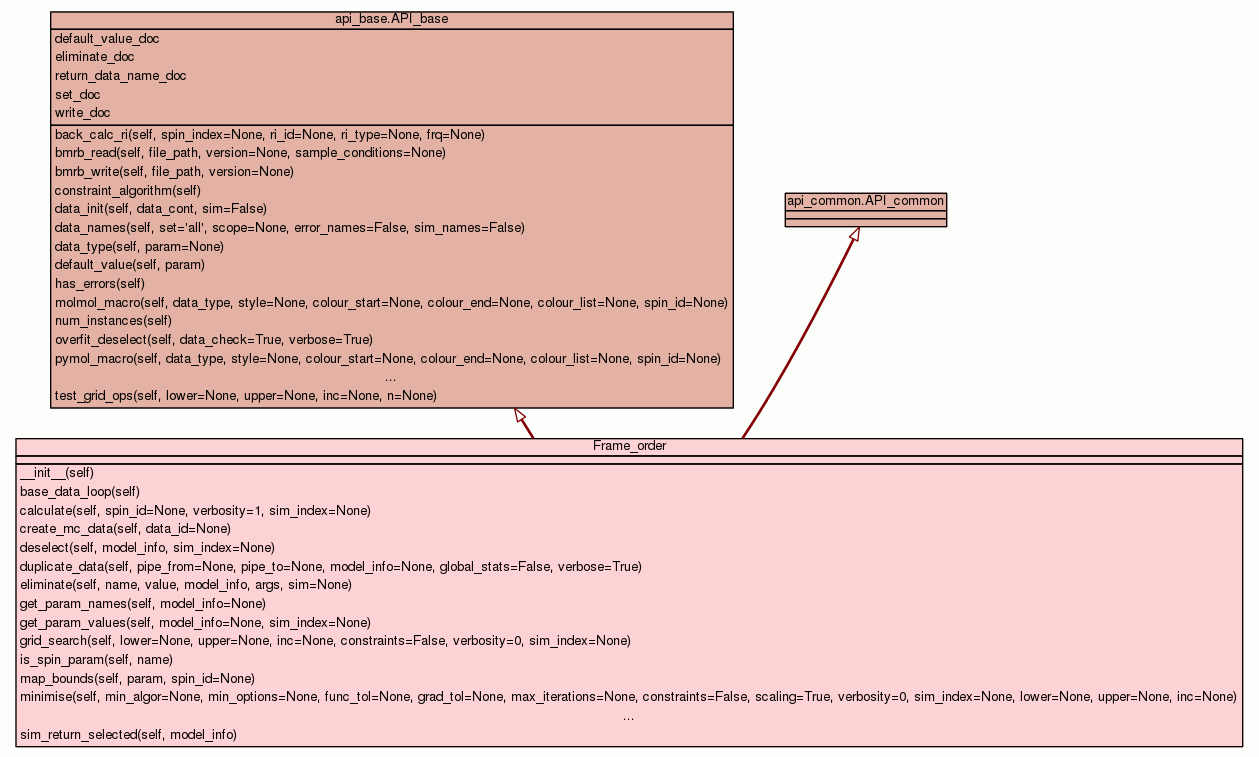Class containing the specific methods of the Frame Order theories.
|
|
|
|
numpy rank-1 array, numpy rank-1 array
|
|
|
numpy rank-1 array
|
|
|
numpy rank-2 array
|
|
|
|
|
|
list of str
|
|
|
|
_check_rdcs(self,
interatom,
spin1,
spin2)
Check if the RDCs for the given interatomic data container should be
used. |
source code
|
|
|
str
|
|
|
list of float
|
_grid_row(self,
incs,
lower,
upper,
dist_type=None,
end_point=True)
Set up a row of the grid search for a given parameter. |
source code
|
|
|
numpy rank-3 array, numpy rank-1 array.
|
|
|
tuple of (numpy rank-2 array, numpy rank-2 array, numpy rank-2 array,
numpy rank-1 array, numpy rank-1 array)
|
|
|
tuple of (numpy rank-2 array, numpy rank-2 array, numpy rank-2 array,
numpy rank-3 array, numpy rank-2 array, numpy rank-2 array)
|
|
|
tuple of 3 numpy nx5D, rank-1 arrays
|
|
|
|
_num_int_pts(self,
num=200000)
Set the number of integration points to use in the quasi-random
Sobol' sequence. |
source code
|
|
|
bool
|
|
|
bool
|
_opt_uses_pcs(self,
align_id)
Determine if the PCS data for the given alignment ID is needed for
optimisation. |
source code
|
|
|
bool
|
_opt_uses_rdc(self,
align_id)
Determine if the RDC data for the given alignment ID is needed for
optimisation. |
source code
|
|
|
int
|
|
|
|
_pdb_ave_pos(self,
file=None,
dir=None,
force=False)
Create a PDB file of the molecule with the moving domains shifted to
the average position. |
source code
|
|
|
|
_pdb_distribution(self,
file=None,
dir=None,
force=False)
Create a PDB file of a distribution of positions coving the full
dynamics of the moving domain. |
source code
|
|
|
|
_pdb_geometric_rep(self,
file=None,
dir=None,
size=30.0,
inc=36,
force=False,
neg_cone=True)
Create a PDB file containing a geometric object representing the
frame order dynamics. |
source code
|
|
|
|
_pdb_model(self,
ave_pos_file='ave_pos.pdb',
rep_file='frame_order.pdb',
dist_file='domain_distribution.pdb',
dir=None,
size=30.0,
inc=36,
force=False,
neg_cone=True)
Create 3 different PDB files for representing the frame order
dynamics of the system. |
source code
|
|
|
|
_pivot(self,
pivot=None,
fix=None)
Set the pivot point for the 2 body motion. |
source code
|
|
|
bool
|
|
|
|
_quad_int(self,
flag=False)
Turn the high precision Scipy quadratic numerical integration on or
off. |
source code
|
|
|
|
|
|
|
|
|
|
|
|
|
_target_fn_setup(self,
sim_index=None,
scaling=True)
Initialise the target function for optimisation or direct
calculation. |
source code
|
|
|
(int, AlignTensorData instance)
|
|
|
bool
|
|
|
|
_update_model(self)
Update the model parameters as necessary. |
source code
|
|
|
|
_unpack_opt_results(self,
results,
scaling=False,
scaling_matrix=None,
sim_index=None)
Unpack and store the Frame Order optimisation results. |
source code
|
|
|
list of str
|
|
|
|
calculate(self,
spin_id=None,
verbosity=1,
sim_index=None)
Calculate the chi-squared value for the current parameter values. |
source code
|
|
|
list of floats
|
|
|
|
|
|
|
duplicate_data(self,
pipe_from=None,
pipe_to=None,
model_info=None,
global_stats=False,
verbose=True)
Duplicate the data specific to a single frame order data pipe. |
source code
|
|
|
bool
|
|
|
list of str
|
|
|
list of str
|
|
|
|
grid_search(self,
lower=None,
upper=None,
inc=None,
constraints=False,
verbosity=0,
sim_index=None)
Perform a grid search. |
source code
|
|
|
bool
|
|
|
list of float
|
|
|
|
minimise(self,
min_algor=None,
min_options=None,
func_tol=None,
grad_tol=None,
max_iterations=None,
constraints=False,
scaling=True,
verbosity=0,
sim_index=None,
lower=None,
upper=None,
inc=None)
Minimisation function. |
source code
|
|
|
str
|
|
|
SpinContainer instance
|
|
|
tuple of (int, int, float)
|
|
|
str
|
|
|
list of float
|
|
|
str
|
|
|
|
|
|
|
|
|
|
|
|
|
|
|
list of float
|
|
|
list of int
|
|
|
Inherited from api_base.API_base:
back_calc_ri,
bmrb_read,
bmrb_write,
constraint_algorithm,
data_init,
data_names,
data_type,
default_value,
has_errors,
molmol_macro,
num_instances,
overfit_deselect,
pymol_macro,
read_columnar_results,
return_conversion_factor,
return_data,
return_data_desc,
return_data_name,
return_grace_string,
return_value,
set_param_values,
set_update,
sim_return_chi2,
skip_function,
test_grid_ops
Inherited from object:
__delattr__,
__format__,
__getattribute__,
__hash__,
__new__,
__reduce__,
__reduce_ex__,
__repr__,
__setattr__,
__sizeof__,
__str__,
__subclasshook__
Inherited from api_common.API_common (private):
_base_data_loop_spin,
_create_mc_relax_data,
_data_init_dummy,
_data_init_spin,
_eliminate_false,
_has_errors_spin,
_is_spin_param_true,
_model_loop_single_global,
_model_loop_spin,
_model_type_global,
_model_type_local,
_num_instances_spin,
_overfit_deselect_dummy,
_return_data_relax_data,
_return_error_relax_data,
_return_no_conversion_factor,
_return_value_general,
_set_error_spin,
_set_param_values_global,
_set_param_values_spin,
_set_selected_sim_global,
_set_selected_sim_spin,
_set_update,
_sim_init_values_spin,
_sim_pack_relax_data,
_sim_return_chi2_spin,
_sim_return_param_spin,
_sim_return_selected_global,
_sim_return_selected_spin,
_test_grid_ops_general
|

